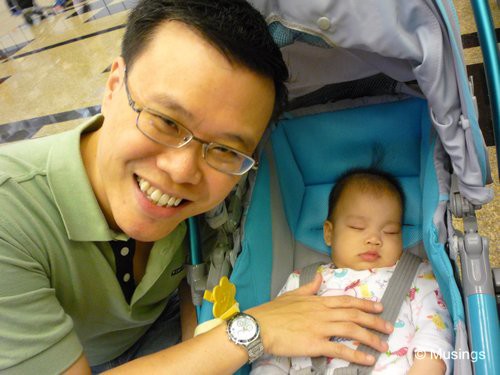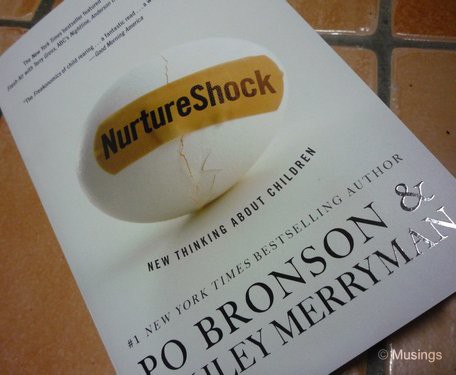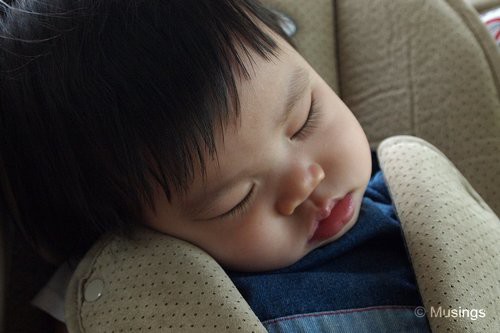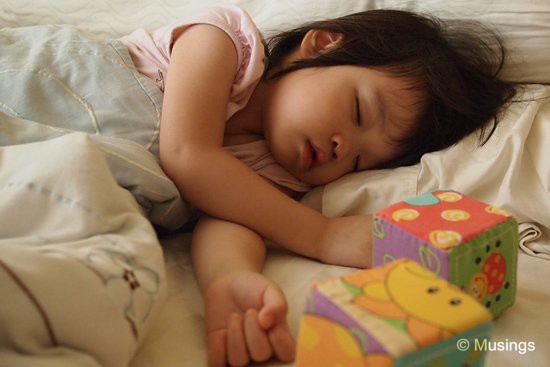My best friend Doreen, an experienced teacher in primary school education, once shared with me that a child grows and develops when she is sleeping. Being uninformed then, I used to associate sleep with down time for the body to rest rather than an important aspect for growth in children.

A few months back, Yang bought a parenting book entitled ‘Nurture Shock’ by PO Bronson & Ashley Merryman. It was highly recommended by his manager. As a science person, I readily lapped up the new information and insights on rearing children that were linked to research findings. Additionally, my training in biology allows me to process the neurological explanations that support the mantra that sleep is important to growing children.

The gist of all that were mentioned and said is this: children who sleep well are intelligent, happy and less likely to become obese.
Slumber time for kids is different from adults. A good night’s sleep helps in long-term learning of language, times tables and any other content-loaded subjects. When a child sleeps, the brain shifts into an efficient storage mode. What was learnt in the day, say new vocabulary, the brain will store psycho-motor skills for enunciation, auditory memories of new sounds and emotions linked to those new words during the different stages of sleep. The more a child learns that day, the more she needs to sleep that very night. What is more is that when she wakes up, she would come up with new insights on her learning the previous day.
Take one of my students for example. She has been consistently doing well for her science tests not because she burns midnight oil to do revision but because she lavishes time to sleep in the night. She maximises the time in the day to learn as much as possible through active listening and questioning during my science lessons and let her brain does the rest at night. She didn’t know anything about the importance of sleep. Rather, she happens to love her sleep. Recently, I noticed that Hannah also displayed the secretive functions of the brain. She learnt ‘2 + 2 = 4’ from watching Mickey Mouse Clubhouse on TV and the next day, she could show us the concept by holding 2 toys in each hand and declared saying “see, two and two is four”. Isn’t that a little application in daily life by the brain?

Now the happy part. In our brain, negative emotions are processed by the amygdala while positive memories gets processed by the hippocampus. The hippocampus’ function is affected more than the amygdala when a person is sleep deprived. Consequently, the person has trouble recalling happy memories and at the same time can remember unhappy times clearly. The more sleep deprived a person is, the more easily depression creeps in.
It sounds strange to dissociate sleep from obesity. I was under the impression that the more one sleeps, the more sedentary one gets and hence the result would be weight gain. Well, recent research says otherwise. Sleep loss can trigger hormonal changes that affect one’s weight. I remember that whenever I stayed up late to study or work, I got hungry easily and resorted to snacking. The culprit is a hormone called ghrelin. Sleep loss also increases the amount of cortisol, a stress hormone, which stimulates the body to make fat. What is worse is the release of human growth hormone that breaks down fat in our body for growth during sleep is affected at the same time.
In conclusion, the earlier a child develops good sleeping habits, the more she would benefit from it. A child’s brain is continuously developing until she hits 21. Any sleep loss during the first 21 years of life will have greater impact on a child’s growth as compared to adults.

Uh oh! Does daytime nap count? My girl does have her afternoon naps (about 1 – 2 hours). But at night, occasionally, she would wake up for water/milk and after that, she would be wide awake for about 2 hours before she goes back to sleep. But overall, she would sleep at least 10 hours a day (on a bad day) and more (on a good day). I am curious, does the brain only develop during the night sleep or do the other sleeping hours count? *very worried*
Hi Theresa; Some links here that talk about this chapter on slumber.
http://www.askmoxie.org/2010/06/discussion-of-nurtureshock-chapter-2-the-lost-hour.html
http://www.hellobee.com/2012/08/02/nurtureshock-the-lost-hour/
Hi Theresa,
So sorry if I cause unnecessary worry. This topic does not apply to infants and toddlers who have yet managed to sleep through the night. However, it is good to encourage good sleeping habits from young and try not to compromise especially when our children get older. Teenagers love to stay up late to socialize online, play computer games and what-not.
Oh ya, the post here was referring to sleep at night as the brain does different things at different sleep stages at night.
Hi
Thanks for the links and the clarification. We are still working on her sleeping pattern at this moment. We are hoping that she gets to sleep well very day. But after reading your posting, I am more than encouraged to work on this area now!
You’re welcomed, Theresa :) Jia you!
Wow, you still remember, Ling! It was SO long ago when I made that comment. Well, a few years back, my lecturer recommended a few books to me when I was doing a research on sleep and stress for an assignment. One of the authors/ experts in this area is Dr. Archibald Hart. He talks about how these two elements could affect our lives (physically, mentally, emotionally and even spiritually). Very interesting information! Check out his books if you have the time. May your family’s sleep, especailly little Hannah’s, be sweet every night! :)
Hi Doreen,
Thanks for the recommendation. Will check it out :) And thanks for the blessing our slumber too! :D The same goes to you and family!
I totally agree with you about the importance of sleep in children. Many times, I find my students following the night prowling habits of their parents & couldn’t concentrate during their lessons. The parents whom I managed to convince to allow their children to turn in early for bed, showed better performance in every area, academically, socially & physically.
@ Ally: *high five* :)
Ok, I better turn in now. My brain would like it too. :)